The Israelis had issued orders banning celebrations for this homecoming.
Sky News
Fri, 24 November 2023
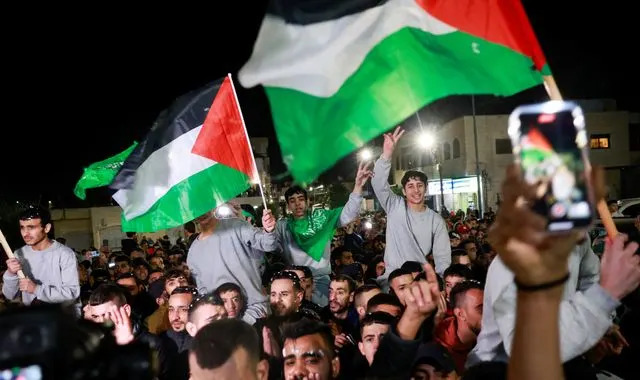
Israel delivered its side of the bargain in scenes of chaos.
The prelude - barrage after barrage of tear gas. Then the coach appeared.
Inside we saw them, the freed Palestinian prisoners revelling in their liberation. The crowd shouted "God is great!".
The Israelis had issued orders banning celebrations for this homecoming.
They were comprehensively ignored. The euphoria could not be supressed.
Hamas has exacted a price for returning a handful of hostages, not just the prisoners themselves but the scenes that accompanied them too.
Atop the bus a Palestinian youth waved green flags the colours of Hamas.
They will claim this as a victory and despite Israel's best efforts this will strengthen Hamas in the West Bank.
The prisoners defied orders not to talk to cameras and were carried aloft through the crowd.
None of the prisoners listed for release have killed people but they have blood on their hands, say Israelis, for attacking Israeli police, soldiers and civilians with knives or other weapons.
For Israelis they are terrorists, for Palestinians they are heroes of the resistance against the hated Israeli occupation.
There had been a tense build up all day.
Israelis moved in to clear the area using tear gas and stun grenades. Some in the crowds were terrified.
At the start of the afternoon we had filmed a mother and father and their young daughters arrive waving while Palestinian flags.
Later we saw them fleeing the tear gas the girls in tears.
"The Israelis want nothing but violence," their father told us.
Tension built as darkness fell.
As Hamas flags were marched into the crowd there were cheers of support for the Hamas military wing that carried out the 7 October attacks.
The Israelis responded with rounds of tear gas and in return Palestinians pelted stones from catapults.
There were casualties as youths were carried to ambulances. But what Palestinians will remember is the scenes of jubilation that will be repeated now in coming nights
Their brothers and sisters released into freedom.
And Hamas taking the credit.
Sky News
Fri, 24 November 2023

Israel delivered its side of the bargain in scenes of chaos.
The prelude - barrage after barrage of tear gas. Then the coach appeared.
Inside we saw them, the freed Palestinian prisoners revelling in their liberation. The crowd shouted "God is great!".
The Israelis had issued orders banning celebrations for this homecoming.
They were comprehensively ignored. The euphoria could not be supressed.
Hamas has exacted a price for returning a handful of hostages, not just the prisoners themselves but the scenes that accompanied them too.
Atop the bus a Palestinian youth waved green flags the colours of Hamas.
They will claim this as a victory and despite Israel's best efforts this will strengthen Hamas in the West Bank.
The prisoners defied orders not to talk to cameras and were carried aloft through the crowd.
None of the prisoners listed for release have killed people but they have blood on their hands, say Israelis, for attacking Israeli police, soldiers and civilians with knives or other weapons.
For Israelis they are terrorists, for Palestinians they are heroes of the resistance against the hated Israeli occupation.
There had been a tense build up all day.
Israelis moved in to clear the area using tear gas and stun grenades. Some in the crowds were terrified.
At the start of the afternoon we had filmed a mother and father and their young daughters arrive waving while Palestinian flags.
Later we saw them fleeing the tear gas the girls in tears.
"The Israelis want nothing but violence," their father told us.
Tension built as darkness fell.
As Hamas flags were marched into the crowd there were cheers of support for the Hamas military wing that carried out the 7 October attacks.
The Israelis responded with rounds of tear gas and in return Palestinians pelted stones from catapults.
There were casualties as youths were carried to ambulances. But what Palestinians will remember is the scenes of jubilation that will be repeated now in coming nights
Their brothers and sisters released into freedom.
And Hamas taking the credit.
Israeli forces fire tear gas at West Bank crowds celebrating release of Palestinian prisoners
Sky News
Updated Fri, 24 November 2023
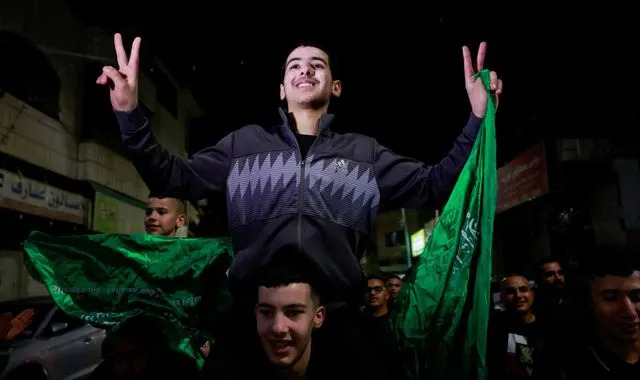
The Israeli military has fired tear gas and stun grenades at crowds in the West Bank - as they celebrated the release of Palestinian prisoners in a hostage deal.
It came as thousands gathered near Ramallah on Friday evening to await the release of 39 women and children following a truce agreement in which Hamas also freed 24 hostages.
Sky's international affairs editor Dominic Waghorn, speaking from the scene, said there had been tension and chaos as a coach carrying some of the prisoners arrived.
The Israeli military were seen firing tear gas, stun grenades and possibly rounds of live ammunition as they attempted to push people back.
He said it came in response to some members of the crowd waving green Hamas flags and chanting pro-Hamas slogans as they celebrated.
There were also angry scenes as protesters shouted "we want our prisoners" as they waited for the release.
But there was also "jubilation" and a "carnival atmosphere" as the detainees were freed.
Sky News' team at the scene witnessed some of the prisoners, mostly women and teenage boys, in a coach, some making V for victory signs and smiling as they were driven past.
Several of those released were then lifted onto the shoulders of jubilant members of the crowd.
Israel is expected to release 150 Palestinian prisoners over the four-day truce - all of them women, children and teenagers.
Most will return to homes in the West Bank and Jerusalem following periods of incarceration lasting between a few months and several years.
Sky News
Updated Fri, 24 November 2023

The Israeli military has fired tear gas and stun grenades at crowds in the West Bank - as they celebrated the release of Palestinian prisoners in a hostage deal.
It came as thousands gathered near Ramallah on Friday evening to await the release of 39 women and children following a truce agreement in which Hamas also freed 24 hostages.
Sky's international affairs editor Dominic Waghorn, speaking from the scene, said there had been tension and chaos as a coach carrying some of the prisoners arrived.
The Israeli military were seen firing tear gas, stun grenades and possibly rounds of live ammunition as they attempted to push people back.
He said it came in response to some members of the crowd waving green Hamas flags and chanting pro-Hamas slogans as they celebrated.
There were also angry scenes as protesters shouted "we want our prisoners" as they waited for the release.
But there was also "jubilation" and a "carnival atmosphere" as the detainees were freed.
Sky News' team at the scene witnessed some of the prisoners, mostly women and teenage boys, in a coach, some making V for victory signs and smiling as they were driven past.
Several of those released were then lifted onto the shoulders of jubilant members of the crowd.
Israel is expected to release 150 Palestinian prisoners over the four-day truce - all of them women, children and teenagers.
Most will return to homes in the West Bank and Jerusalem following periods of incarceration lasting between a few months and several years.
‘This is collective punishment:’ West Bank Palestinians under curfew say they are being punished for something they did not do
Tara John, CNN
Thu, November 23, 2023
Palestinian educator Tarik Betar has known only a life of repression and indignity, he told CNN, with longstanding restrictions, checkpoints and curfews, put in place by the Israeli military in the 1990s, meaning he is unable to walk across his street in the West Bank city of Hebron.
Betar, who works at the local polytechnic college, said those restrictions became a chokehold the day Hamas militants from Gaza attacked Israel, killing at least 1,200 people. The 47-year-old is one of thousands of Palestinians living in nearly a dozen neighborhoods in Israeli-controlled areas of Hebron, who have been effectively “imprisoned at home” by the Israel Defense Forces (IDF) since October 7, according to Israeli human rights group B’Tselem.
A full curfew was imposed that day on those neighborhoods, which surround Hebron’s old city, where Palestinians were not allowed to leave their homes, according to B’Tselem and other residents. It was partially lifted two weeks later, allowing Palestinians to leave the area between 8 and 9 a.m. and return home between 4 and 5 p.m. on Sunday, Tuesday and Thursday, said Betar.
Residents and activists have complained about running out of food, adults missing work, of being fearful and facing threats from settlers for opening their windows or letting their children out onto the street, and being prevented from returning home in time for curfew as they attempt to pass some of the dozens of checkpoints that populate the area.
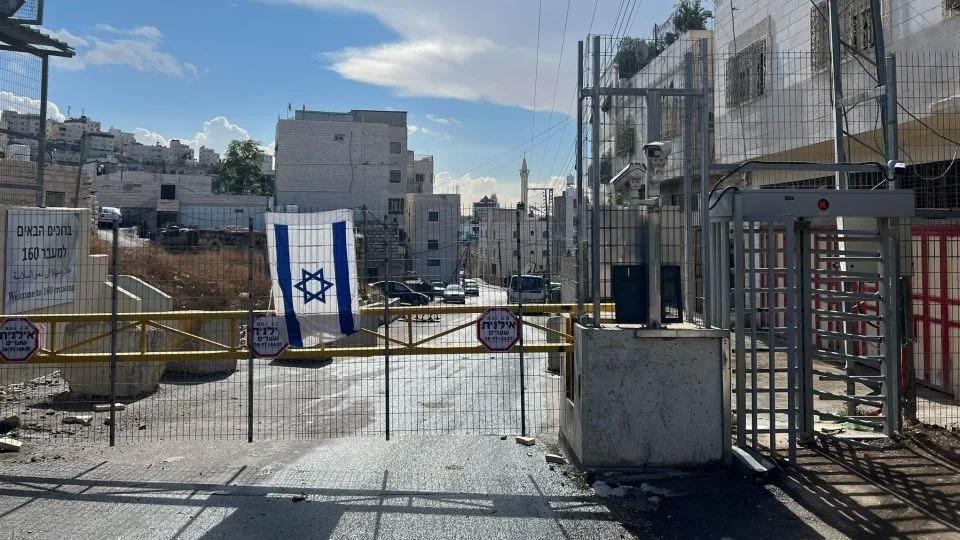
One of Hebron's old city's many checkpoints is photographed on November 17. - Tara John/CNN
When Betar’s wife fell ill and was struggling to breathe last week, the curfew prevented the couple from walking out to see a doctor, so an ambulance had to be called. “I am not allowed to open my door or my window… I called the ambulance, and they arrived after two hours and 57 minutes exactly,” he said, explaining that the medics had to gain Israeli permission to enter the area and navigate a series of checkpoints to get to his home.
B’Tselem describes the “blanket movement ban” as a “collective punishment” against Palestinians “because we’re talking about taking civilians, who did nothing wrong, and placing extreme limitations that disrupts every aspect of their daily lives with no reason,” Dror Sadot, B’Tselem’s spokesperson, told CNN.
The IDF said there had been “a significant increase in terrorist attacks” in the West Bank since the war began and that its troops had been conducting “nightly counterterrorism operations to apprehend suspects, some of them are part of the Hamas terrorist organization.”
While it did not address the curfew directly in the statement, the IDF said that “as part of the security operations in the area, dynamic checkpoints have been put up over different places. The mission of the IDF is to maintain the security of all residents of the area, and to act to prevent terrorism and activities that endanger the citizens of the State of Israel.”
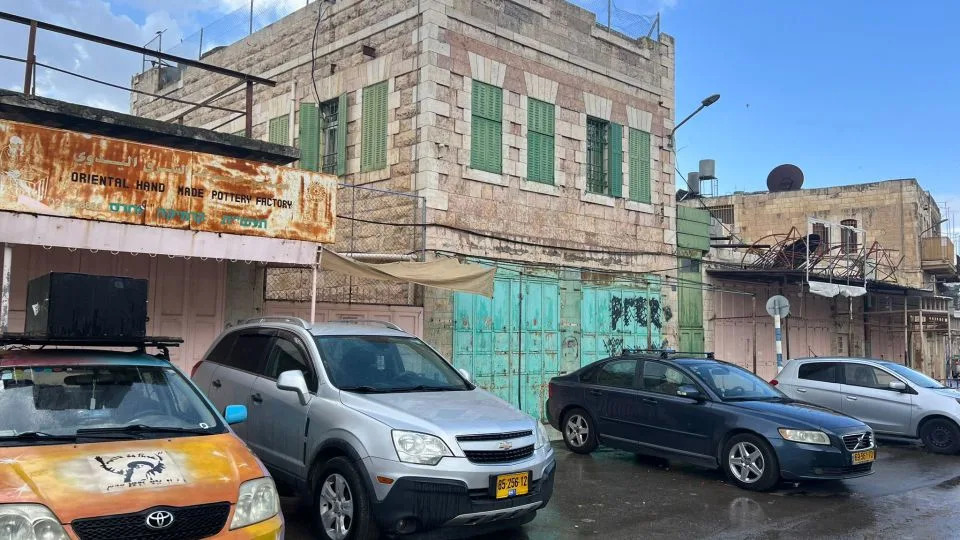
Tarik Betar's home is seen in the old city of Hebron on November 17. - Tara John/CNN
Increased separation
Israel has occupied the West Bank since seizing the territory from Jordanian military occupation in 1967. It later agreed to transfer limited control over parts of the territory to the Palestinian Authority, after agreements signed in the 1990s. But Israel has continued to build settlements there, considered illegal under international law, encroaching into land that Palestinians and the international community view as territory for a future Palestinian state. Israel views the West Bank as “disputed territory,” and contends its settlement policy is legal.
The West Bank has seen a surge in settler attacks this year, including one that an Israeli military commander called a “pogrom.” The issue has concerned United States officials, with President Joe Biden saying that the US was prepared to issue visa bans against “extremists attacking civilians in the West Bank,” in a Washington Post op-ed over the weekend.
Even by the standards of the West Bank, the situation in Hebron is complicated. A predominantly Palestinian city, it has Israeli settlements right in the center. The result is both a physical and legal segregation between the hundreds of Jewish settlers and the thousands of Palestinians who live on the streets around the old city.
As Betar’s home is meters away from one of the West Bank’s most contested and holiest places, known to Jews as the Cave of the Patriarchs and to Muslims as the Ibrahimi Mosque, he is restricted from turning right when he exits his front door.
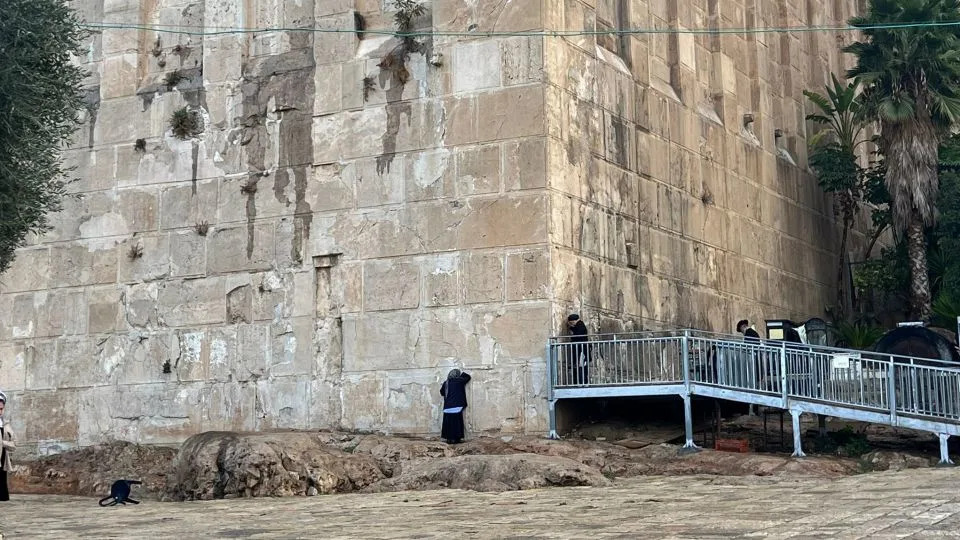
People pray on the exterior wall of the Cave of the Patriarchs on November 17 in Hebron, West Bank. - Tara John/CNN
His neighborhood began to hollow out after a 1994 massacre when a Jewish settler walked into the Ibrahimi Mosque and killed 29 people, say residents, prompting Israel to introduce a policy of separation in the area, according to a 2019 United Nations report.
That policy hardened following the second Palestinian intifada between 2000 and 2005 and increasing Jewish settler-Palestinian violence that saw the deployment of new checkpoints, restrictions on the movement of Palestinians and closure of shops.
Thousands of Palestinians have since been forced to leave the area amid the settler attacks and “constant raids and incursions into their homes by Israeli forces, which often include the temporary takeover of parts of the homes,” the report added.
The old city is now a warren of restrictions and limits for the Palestinians living there. Some areas around Israeli settlements and the Jewish side of the Cave of Patriarchs, close to Betar’s home, have been entirely closed off to Palestinians for decades, according to a map by B’Tselem and conversations with residents.
The Palestinian population in the area has meanwhile shrunk to an estimated 33,000 people, says Sadot, B’Tselem’s spokesperson, and she and other activists worry restrictions are being used as a pretext to push Palestinians out altogether.
The post-October 7 restrictions are “not happening in a political vacuum,” Sadot said. Last year, Israel gained its most right-wing government in history, with some government ministers, like National Security Minister Itamar Ben Gvir, supporting the annexation of the West Bank. Ben Gvir himself lives in Kiryat Arba, a settlement on the outskirts of Hebron.
“My worry is that more people will leave,” Hisham Sharibati, a human rights activist who lives outside Hebron’s old city, told CNN. He explained a curfew was previously installed during the second Palestinian intifada, which saw shop owners leave by the droves. “Now we are having curfew again – it’s a big risk.”
‘An unannounced war’
The restrictions on Palestinians’ movement are in stark contrast to the freedoms afforded an estimated 700 hardline Jewish settlers, living in areas of the old city and still free to move about with the military’s protection. They are also accused of behaving with impunity and violence towards Palestinians and their property.
Palestinian human rights activist Issa Amro, who lives in the area and campaigns against Israeli occupation, told CNN that on October 7 Israeli soldiers and settlers detained him for 10 hours and physically abused him, sharing pictures with CNN of his swollen and cut wrists, injuries which he says were caused by plastic zip-ties.
“We sent activists to try find him, and a lawyer called the army to find his whereabouts,” his attorney Michael Sfard told CNN on the phone. Since his release, Amro has barricaded himself into his house, in fear of further violence from soldiers and settlers. He said they attempted to evict him the week of October 20. “There is an unannounced war in the West Bank,” Sfard told CNN.
When asked about Amro’s allegations, the IDF in a statement to CNN said: “Issa Amro’s application regarding the restriction of his presence in the territory was received and is under consideration. The IDF operates in accordance to international law.”
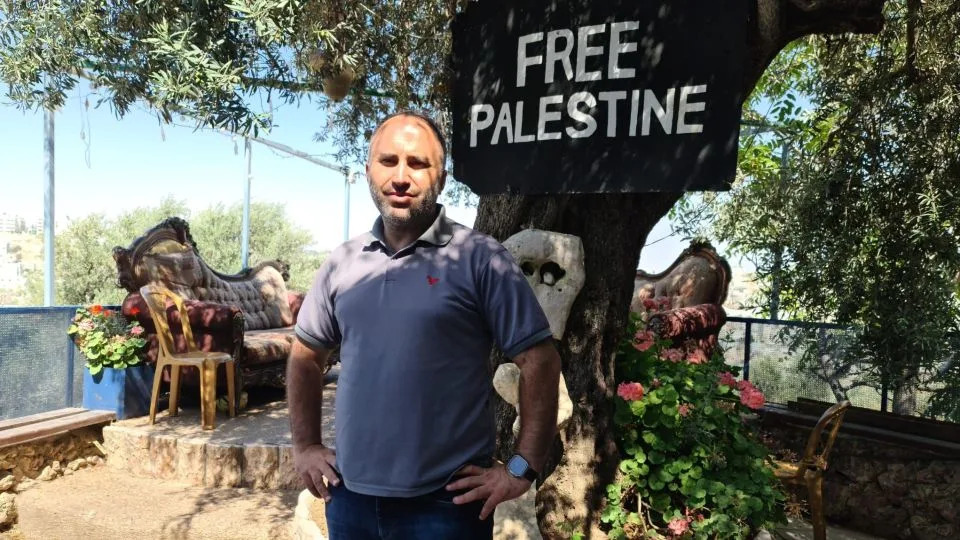
Issa Amro is seen in the garden of his house in Hebron. - Courtesy of Issa Amro
On a hill in Tel-Rumaida, close to Amro’s home, Yishai Fleisher, the international spokesperson for the Jewish Community of Hebron, approached CNN’s team with a rifle slung over his soldier. Fleisher agreed that Amro had been detained, but said he had been held by IDF soldiers.
“They were IDF soldiers,” he said, adding that Amro “should be behind bars, he’s a criminal of the worst kind – just happens to be a front, a slick with liberal language.”
Amro’s attorney, Sfard, said in the statement that “if there was a shred of evidence that he has been engaging in any criminal activity he would immediately be sent for a long time in prison. The fact that Issa is not in prison means that all the efforts by the settlers and their supporters and by the occupation to frame him have all failed. All they have left is to incite and spread lies about Issa.”
The West Bank has thousands of years of Jewish history and many Jewish holy sites; religious-national settlers, like those in Hebron, believe these have always been part of the Land of Israel, as promised to the Jewish people in the Old Testament. Settlers believe Hebron should be under Israeli sovereignty as “it is an integral part of Jewish history,” Fleisher said.
About 500,000 Jewish settlers now live in the West Bank, according to Peace Now, an Israeli group that advocates for peace and monitors settlements. Many of these settlements are heavily guarded, fenced-off areas that are completely off limits to Palestinians.
Most of the world considers these settlements illegal under international law and Israel has been criticized for allowing their expansion – and, in some cases, supporting them with tax breaks and state-funded security.
A ghost town
The Israeli-controlled area feels like a town with no people. During CNN’s visit to the desolate and heavily guarded old city last week , the only signs of life came from the Israeli soldiers at their posts, a few reservists, and a handful of settlers and their children. One Muslim family emerged later in the evening, passing a guard post.
The once-bustling market streets and thoroughfares now stand empty, apartment windows are closed and covered in metal grates, and a dead cat lies decomposing on a road.
Palestinian resident Ahmad, who declined to provide his last name for fear of repercussions, says his family moved to the area when he was seven. Even back then, it was too dangerous for Palestinian children to play outside, he said, adding: “It was not a childhood.”
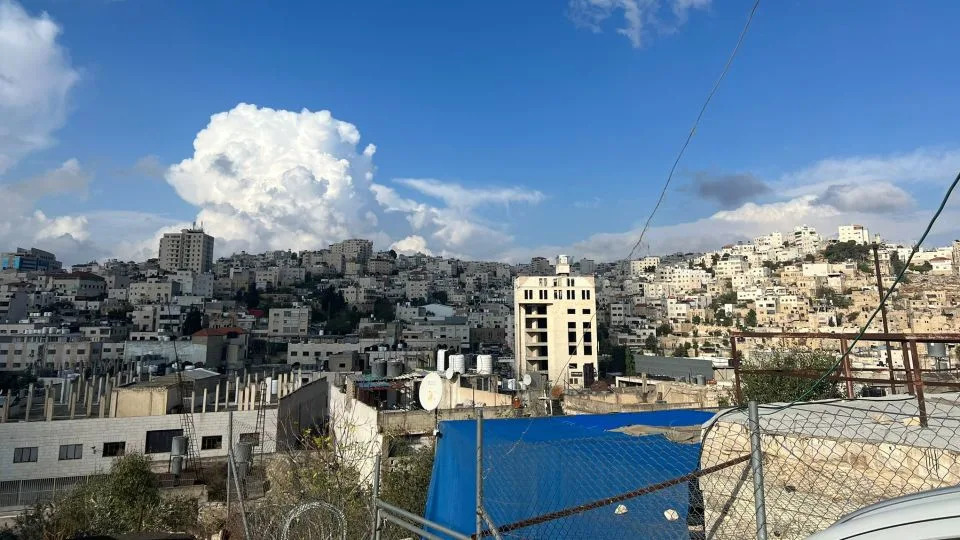
A view of the city of Hebron from the old city on November 17. - Tara John/CNN
In “normal” times, the threat of settler attacks was high, but now his family is too scared to leave their home, he said. “It’s a really dangerous thing, the settlers really hate us,” he said.
The curfew introduced after October 7 left him unable to work until November, depleting his savings, he said. He now stays with relatives in the Palestinian-controlled side of Hebron during the week, so he can earn an income as a barista, and bring home food when the checkpoints open on Sunday.
“They are doing collective punishment,” he told CNN. “I know the media attention is on Gaza, for good reason, but the world does not know what the settlers and the IDF are doing over here,” he said.
Betar grew up in the home he currently lives in, as did his father and grandfather. It is why he is refusing to leave. The past month has however pushed him to the brink.
His house has no yard, so he had fenced up the roof so his five children could run around. But since the Hamas attacks, soldiers on roof positions have told them to remain inside the house.
“Eat, go to the bathroom and study on Zoom – this is their lives now,” he told CNN. “My home is very small, we have no space to play, no space to go walk freely now.”
It now takes him hours to do a simple supermarket shop due to the three checkpoints he has to pass to get home, in narrow timeslots.
He could instead walk across the road from his house to the café and souvenir shop. But Betar is not allowed in as the road itself is closed to Palestinians. Meanwhile, visitors, settlers and soldiers freely use the cafe.
“We’ve had enough –– we want to enjoy our lives as any person in the West,” he said.
Tara John, CNN
Thu, November 23, 2023
Palestinian educator Tarik Betar has known only a life of repression and indignity, he told CNN, with longstanding restrictions, checkpoints and curfews, put in place by the Israeli military in the 1990s, meaning he is unable to walk across his street in the West Bank city of Hebron.
Betar, who works at the local polytechnic college, said those restrictions became a chokehold the day Hamas militants from Gaza attacked Israel, killing at least 1,200 people. The 47-year-old is one of thousands of Palestinians living in nearly a dozen neighborhoods in Israeli-controlled areas of Hebron, who have been effectively “imprisoned at home” by the Israel Defense Forces (IDF) since October 7, according to Israeli human rights group B’Tselem.
A full curfew was imposed that day on those neighborhoods, which surround Hebron’s old city, where Palestinians were not allowed to leave their homes, according to B’Tselem and other residents. It was partially lifted two weeks later, allowing Palestinians to leave the area between 8 and 9 a.m. and return home between 4 and 5 p.m. on Sunday, Tuesday and Thursday, said Betar.
Residents and activists have complained about running out of food, adults missing work, of being fearful and facing threats from settlers for opening their windows or letting their children out onto the street, and being prevented from returning home in time for curfew as they attempt to pass some of the dozens of checkpoints that populate the area.

One of Hebron's old city's many checkpoints is photographed on November 17. - Tara John/CNN
When Betar’s wife fell ill and was struggling to breathe last week, the curfew prevented the couple from walking out to see a doctor, so an ambulance had to be called. “I am not allowed to open my door or my window… I called the ambulance, and they arrived after two hours and 57 minutes exactly,” he said, explaining that the medics had to gain Israeli permission to enter the area and navigate a series of checkpoints to get to his home.
B’Tselem describes the “blanket movement ban” as a “collective punishment” against Palestinians “because we’re talking about taking civilians, who did nothing wrong, and placing extreme limitations that disrupts every aspect of their daily lives with no reason,” Dror Sadot, B’Tselem’s spokesperson, told CNN.
The IDF said there had been “a significant increase in terrorist attacks” in the West Bank since the war began and that its troops had been conducting “nightly counterterrorism operations to apprehend suspects, some of them are part of the Hamas terrorist organization.”
While it did not address the curfew directly in the statement, the IDF said that “as part of the security operations in the area, dynamic checkpoints have been put up over different places. The mission of the IDF is to maintain the security of all residents of the area, and to act to prevent terrorism and activities that endanger the citizens of the State of Israel.”

Tarik Betar's home is seen in the old city of Hebron on November 17. - Tara John/CNN
Increased separation
Israel has occupied the West Bank since seizing the territory from Jordanian military occupation in 1967. It later agreed to transfer limited control over parts of the territory to the Palestinian Authority, after agreements signed in the 1990s. But Israel has continued to build settlements there, considered illegal under international law, encroaching into land that Palestinians and the international community view as territory for a future Palestinian state. Israel views the West Bank as “disputed territory,” and contends its settlement policy is legal.
The West Bank has seen a surge in settler attacks this year, including one that an Israeli military commander called a “pogrom.” The issue has concerned United States officials, with President Joe Biden saying that the US was prepared to issue visa bans against “extremists attacking civilians in the West Bank,” in a Washington Post op-ed over the weekend.
Even by the standards of the West Bank, the situation in Hebron is complicated. A predominantly Palestinian city, it has Israeli settlements right in the center. The result is both a physical and legal segregation between the hundreds of Jewish settlers and the thousands of Palestinians who live on the streets around the old city.
As Betar’s home is meters away from one of the West Bank’s most contested and holiest places, known to Jews as the Cave of the Patriarchs and to Muslims as the Ibrahimi Mosque, he is restricted from turning right when he exits his front door.

People pray on the exterior wall of the Cave of the Patriarchs on November 17 in Hebron, West Bank. - Tara John/CNN
His neighborhood began to hollow out after a 1994 massacre when a Jewish settler walked into the Ibrahimi Mosque and killed 29 people, say residents, prompting Israel to introduce a policy of separation in the area, according to a 2019 United Nations report.
That policy hardened following the second Palestinian intifada between 2000 and 2005 and increasing Jewish settler-Palestinian violence that saw the deployment of new checkpoints, restrictions on the movement of Palestinians and closure of shops.
Thousands of Palestinians have since been forced to leave the area amid the settler attacks and “constant raids and incursions into their homes by Israeli forces, which often include the temporary takeover of parts of the homes,” the report added.
The old city is now a warren of restrictions and limits for the Palestinians living there. Some areas around Israeli settlements and the Jewish side of the Cave of Patriarchs, close to Betar’s home, have been entirely closed off to Palestinians for decades, according to a map by B’Tselem and conversations with residents.
The Palestinian population in the area has meanwhile shrunk to an estimated 33,000 people, says Sadot, B’Tselem’s spokesperson, and she and other activists worry restrictions are being used as a pretext to push Palestinians out altogether.
The post-October 7 restrictions are “not happening in a political vacuum,” Sadot said. Last year, Israel gained its most right-wing government in history, with some government ministers, like National Security Minister Itamar Ben Gvir, supporting the annexation of the West Bank. Ben Gvir himself lives in Kiryat Arba, a settlement on the outskirts of Hebron.
“My worry is that more people will leave,” Hisham Sharibati, a human rights activist who lives outside Hebron’s old city, told CNN. He explained a curfew was previously installed during the second Palestinian intifada, which saw shop owners leave by the droves. “Now we are having curfew again – it’s a big risk.”
‘An unannounced war’
The restrictions on Palestinians’ movement are in stark contrast to the freedoms afforded an estimated 700 hardline Jewish settlers, living in areas of the old city and still free to move about with the military’s protection. They are also accused of behaving with impunity and violence towards Palestinians and their property.
Palestinian human rights activist Issa Amro, who lives in the area and campaigns against Israeli occupation, told CNN that on October 7 Israeli soldiers and settlers detained him for 10 hours and physically abused him, sharing pictures with CNN of his swollen and cut wrists, injuries which he says were caused by plastic zip-ties.
“We sent activists to try find him, and a lawyer called the army to find his whereabouts,” his attorney Michael Sfard told CNN on the phone. Since his release, Amro has barricaded himself into his house, in fear of further violence from soldiers and settlers. He said they attempted to evict him the week of October 20. “There is an unannounced war in the West Bank,” Sfard told CNN.
When asked about Amro’s allegations, the IDF in a statement to CNN said: “Issa Amro’s application regarding the restriction of his presence in the territory was received and is under consideration. The IDF operates in accordance to international law.”

Issa Amro is seen in the garden of his house in Hebron. - Courtesy of Issa Amro
On a hill in Tel-Rumaida, close to Amro’s home, Yishai Fleisher, the international spokesperson for the Jewish Community of Hebron, approached CNN’s team with a rifle slung over his soldier. Fleisher agreed that Amro had been detained, but said he had been held by IDF soldiers.
“They were IDF soldiers,” he said, adding that Amro “should be behind bars, he’s a criminal of the worst kind – just happens to be a front, a slick with liberal language.”
Amro’s attorney, Sfard, said in the statement that “if there was a shred of evidence that he has been engaging in any criminal activity he would immediately be sent for a long time in prison. The fact that Issa is not in prison means that all the efforts by the settlers and their supporters and by the occupation to frame him have all failed. All they have left is to incite and spread lies about Issa.”
The West Bank has thousands of years of Jewish history and many Jewish holy sites; religious-national settlers, like those in Hebron, believe these have always been part of the Land of Israel, as promised to the Jewish people in the Old Testament. Settlers believe Hebron should be under Israeli sovereignty as “it is an integral part of Jewish history,” Fleisher said.
About 500,000 Jewish settlers now live in the West Bank, according to Peace Now, an Israeli group that advocates for peace and monitors settlements. Many of these settlements are heavily guarded, fenced-off areas that are completely off limits to Palestinians.
Most of the world considers these settlements illegal under international law and Israel has been criticized for allowing their expansion – and, in some cases, supporting them with tax breaks and state-funded security.
A ghost town
The Israeli-controlled area feels like a town with no people. During CNN’s visit to the desolate and heavily guarded old city last week , the only signs of life came from the Israeli soldiers at their posts, a few reservists, and a handful of settlers and their children. One Muslim family emerged later in the evening, passing a guard post.
The once-bustling market streets and thoroughfares now stand empty, apartment windows are closed and covered in metal grates, and a dead cat lies decomposing on a road.
Palestinian resident Ahmad, who declined to provide his last name for fear of repercussions, says his family moved to the area when he was seven. Even back then, it was too dangerous for Palestinian children to play outside, he said, adding: “It was not a childhood.”

A view of the city of Hebron from the old city on November 17. - Tara John/CNN
In “normal” times, the threat of settler attacks was high, but now his family is too scared to leave their home, he said. “It’s a really dangerous thing, the settlers really hate us,” he said.
The curfew introduced after October 7 left him unable to work until November, depleting his savings, he said. He now stays with relatives in the Palestinian-controlled side of Hebron during the week, so he can earn an income as a barista, and bring home food when the checkpoints open on Sunday.
“They are doing collective punishment,” he told CNN. “I know the media attention is on Gaza, for good reason, but the world does not know what the settlers and the IDF are doing over here,” he said.
Betar grew up in the home he currently lives in, as did his father and grandfather. It is why he is refusing to leave. The past month has however pushed him to the brink.
His house has no yard, so he had fenced up the roof so his five children could run around. But since the Hamas attacks, soldiers on roof positions have told them to remain inside the house.
“Eat, go to the bathroom and study on Zoom – this is their lives now,” he told CNN. “My home is very small, we have no space to play, no space to go walk freely now.”
It now takes him hours to do a simple supermarket shop due to the three checkpoints he has to pass to get home, in narrow timeslots.
He could instead walk across the road from his house to the café and souvenir shop. But Betar is not allowed in as the road itself is closed to Palestinians. Meanwhile, visitors, settlers and soldiers freely use the cafe.
“We’ve had enough –– we want to enjoy our lives as any person in the West,” he said.
No comments:
Post a Comment